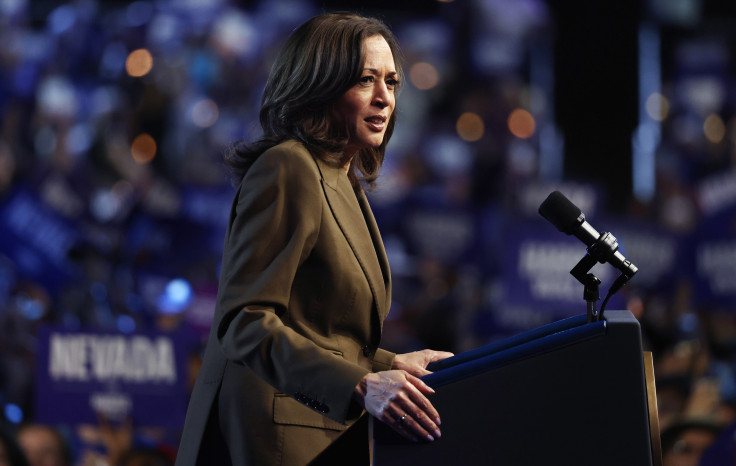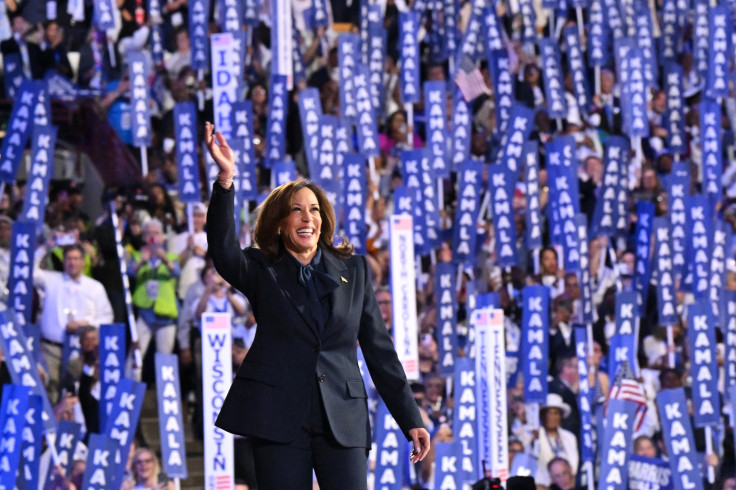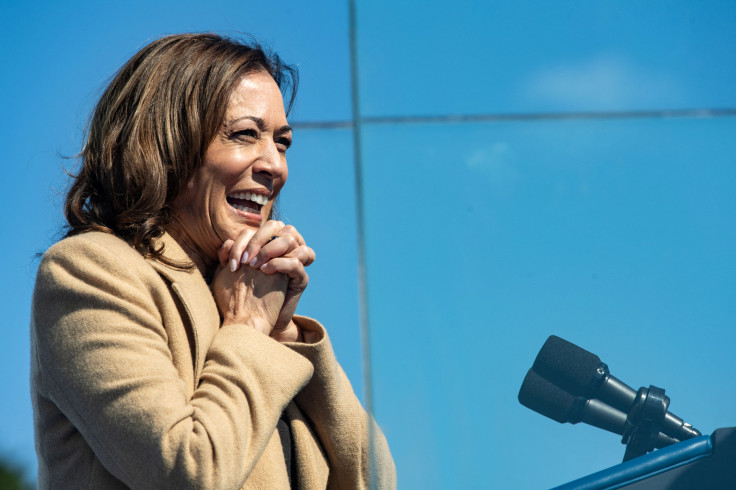
Vice President Kamala Harris could make history in November if she wins the elections, becoming the first female president of the United States. The achievement would be the culmination of a career in the public eye that has also been characterized by breaking of glass ceilings, including becoming the first woman, the first African American and the first Asian American to be attorney general of California and Vice President of the country.
But her legacy may be tainted by partisanship.
A recent poll published by the Alliance for Black Equality, an advocacy organization that seeks to target Black swing voters in battleground states, found that despite the significance of her nomination at the top of the Democratic ticket, women's views on Harris are strongly colored by voters' partisanship and ideology.
The study was conducted between Sept. 5-10 among 1,487 women at the national level with an oversample of Black and Latina women.
Among Democrat-identified respondents, 81% said it was very or somewhat important to them to see Harris become the first woman president of the United States. Conversely, only 13% of Republican-identified respondents said the same, with 17% feeling indifferent.
Nevertheless, when asked whether Harris' rise shows young girls that anything is attainable in America, a sentiment of agreement was more widespread. For that question, 78% of Democrat respondents strongly or somewhat agree, while 33% of Republican respondents said the same.
The study also dug into the concept of "Linked Fate" among women— the idea that women's fortunes in society are connected. In this topic, the majority of respondents agreed, with 54% of Latinas in particular either somewhat or strongly concurring with the statement.
The poll comes as gender has taken a major role throughout the cycle, but not during Harris' campaign. Instead, she has opted to focus on her immigrant and middle-class roots to appeal to voters.
To dive deeper into the data, The Latin Times recently sat down with Aimee Allison, founder of She The People and the advocate behind the study. In her role, she leverages media, research and analysis to show the power of the women of color electorate, increase voter engagement, and advocate for racial, economic and gender justice.
The conversation has been edited for length and clarity.
The Latin Times: What are some of the main issues for women, particularly Latina women, ahead of November as you see it in your study?
Aimee Allison: the main issue that our polling revealed, and I would just first want to say Latinas are under polled and underrepresented in national polls. So we wanted to make sure that Latinas were represented, but also, to show that women of color aren't a monolith. So the polling reflected a relatively high number of undecided voters amongst Latinas. So we delved into the messages and the actions that the campaign could take that would move them from an undecided column to supporting Kamala Harris. So we found a number of things that revealed that the Latina vote can be supercharged in the last four weeks of the election, with some changes that really lean into identity and key issues that are important to Latinas.
LT: Taking the information from this poll, what are some issues that both Republican and Democrat candidates should be focused on during this final sprint of the campaign?
AA: What we learned from the poll is Latinas are very interested in hearing much more about immigration. What's the plan on immigration? And in that way, they have a lot in common with Asian American women, because immigration is an issue that Latinos are very, very interested in hearing more about. Latinas are also first and foremost interested in the economy, conversations about the cost of living, and what the solutions are. And then this isn't a surprise, but gun violence and the solution of gun violence is also a very important issue. So when we asked women of color, what issues do they need to hear more from Kamala Harris on those were the top three for Latinas. But I could say for women of color, other top issues included abortion and abortion rights. That conversation about defending a woman's right to reproductive health was a top issue across all the different subgroups and women of color.

LT: Like you mentioned, reproductive rights have been at the forefront of this cycle, having very different interpretations from both sides of the aisle. How have these discussions fared with women? Is this something where Harris may have an advantage?
AA: The polling results show that the stronger abortion rights stance Kamala Harris has the higher her support is. And I think there's no doubt that this is one of the most winning issues in 2024. I think the challenge right now is that amongst undecided voters, and that 11% of Latinas included, there's many reasons that people consider themselves undecided. One of the things that we discovered and digging into the data, and the pollster was talking with me about this is that this is a group of voters who didn't watch the DNC, largely don't follow politics on a day to day basis, and may not know all the details, so that they're still trying to figure out who stands for what? And these Latina undecided voters include people who are still learning about the issues, so we are arguing that Kamala Harris campaign needs to go back and reinforce the issues, including right to abortion and including her identity, talking about her identity to this group, because that does move them from the undecided category.
The other dynamic that we see because Latinas are, I mean, you could argue that black and white voters identity, it's not a monolith, but they've flattened in terms of identity, whereas Latinas and Asian Americans are way, way, way more diverse as groups. There's just so much diversity, and people may end up with cross pressures. On one hand, Latinos overwhelmingly support abortion rights, but they may live in neighborhoods where they get the message that Democrats are bad on something else. So I think sometimes undecided voters are dealing with cross pressures and they're dealing with a number of assumptions and beliefs that come from their own particular story and family history. So I think what the poll is showing is that the more that we both understand the diversity of Latinas and talk about the issues, particularly Kamala Harris's stand, the more that this group of undecided voters gets drawn into actually participating in the election.
LT: When respondents were asked about whether Harris' gender would make it harder for her to win the election, the majority of Democrats agreed, while Republicans disagreed. Where do you think this difference stems from?
AA: I think it's PTSD from Hillary Clinton. Honestly, that's what I think.I mean it's clear because this is the only poll of its kind that we have to do a lot more of research to really understand everything. But what we are surmising is that because in 2016 the Hillary Clinton campaign leaned into this messaging of "I'm with her" and being the first woman in the White House. This year they said, well, "gender will make it difficult to get elected president." But it's not 2016. In 2024 women of color, Black, Latina, Asian Americana, we have a lot more influence and power, and we're aware of how much in terms of our numbers and our vote. So I think in some ways the Democrats have overcorrected with being afraid of talking about gender in the same way. And what we're saying with this is that we're at the point now where we can talk about, "hey,, for your daughter and your grandchildren and your family, we can make history." And later on in the survey, even though a lot of people said that gender is going to be an issue, it also asks about role model potential and appreciating her. Kamala Harris is a role model. So I think women of color are really at the forefront of a larger cultural trend where we don't have to pretend our gender doesn't matter when it comes to building political power.
LT: There's been a lot of discussions about the differences between the Harris and Clinton 2016 campaign, particularly mentioning how Clinton often highlighted the breaking of the glass ceiling, which turned out to be unpopular with the general public. Looking at the data of this study, what do you make of those discussions? Is that narrative unpopular with women and Latinas? Do you think this has changed throughout the campaign?
AA: I think when Kamala Harris first reintroduced herself as the presidential candidate a couple of months ago, she talked a lot about her story, And she talked about her identity, and she talked about being a working class kid in Oakland. She talked about her parents in the immigrant story, which by the way, I think for Latinas and Asian Americans, being reminded that Kamala Harris is in the immigrant story is very powerful, because they can see themselves in her, I think generally, because our culture is moving forward, we can look back at Hillary Clinton and see the mistakes that she made. I was there, active in electoral politics and black and brown women were not front and center in the messaging, we weren't prioritized as voters, our vote was taken for granted. The talk about putting a woman in the White House is really around white women and their aspirations and drawing like a very specific American tradition that includes mainly white women and activism for the vote, a vote which we did not have largely until 1965. So there were a lot of mistakes. I think Kamala Harris, her campaign, has a potential of fully, kind of supercharging the support by deeply tapping into what makes brown women and black women powerful in this country. And it's not an apologetic thing at all. It's like, we're women, we're women of color. Women of color are the majority of women in my State of California and in seven other states, and soon, everywhere. And so we don't have to shrink from that or hide from that. That's the source of our power.

LT: Undecided voters have often cited not knowing enough about Harris and her policies as reasons to be turned off by her. Do you think these claims have anything to do with a potential lack of trust due to her gender?
AA: Well, I think part of our conclusion is that Kamala Harris should, as a priority in these last weeks, reintroduce her identity particularly to Latinas and Asian American women, because we've shown how that moves voters. So I do think there's a huge opportunity just because of the numbers of Latinas. It's just very, very powerful. And we saw the power of Latinas in 2020 so there's no reason with an even larger population that that couldn't happen in the last few weeks. So I do think that's a big opportunity.
LT: Moving forward, what are some things the Harris campaign may do to continue connecting with WOC, particularly those who may still be undecided? Is there anything Trump can do to also improve his chances among WOC?
AA: First and foremost is that Kamala Harris needs to specifically communicate to Latinas and Asian Americans and younger black women actually, who still don't have the highest level of support. She needs to reintroduce herself with her gender and race and nationality, like all of her identities, to reintroduce herself, and that alone has shown that it would bump support around 10%. She needs to, she needs to talk about abortion rights with this group. And you might say, "well, everyone knows that she supports codifying and making laws protecting reproductive rights and that Trump wants to support a national abortion ban." I think she needs to not assume that people know those messages and keep messaging that. That alone will increase support for her 20%. Part of the reason I think that Trump has been skittish on his role with abortion, even though his vice president has suggested he supports national abortion ban, and even though he supported state abortion bans, which have led to criminal action and arrests of women and women dying or having severe medical problems. He doesn't want that associated with them with his campaign, even though that's part of what they're planning to do, even his
Supreme Court Justice picks. So I think what Trump is trying to do is to not talk about abortion, and what we're saying is the winning message is to talk about protecting abortion rights and not shying away from that issue. And that goes for people who are registered Democrats, Republicans and Independents. In other words, in the last sprint, the more that Kamala Harris leans into her plans to protect that, and the more that Trump— despite his best efforts— he will continue limiting people's women's reproductive rights, those two things are going to have a big impact in the last four weeks.
© 2025 Latin Times. All rights reserved. Do not reproduce without permission.




